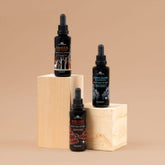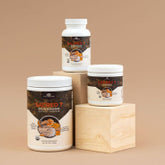
How to Pair Your Lion's Mane Mushroom Tincture with Tea
Lion’s Mane (Hericium erinaceus) has been used in traditional Chinese medicine to support the body’s organ systems and increase vitality. Today, modern medicine has compiled evidence to support the claims of the mushroom’s beneficial nature. Studies have found that Lion’s Mane can help immune, cognitive, and gut health.
The unique-looking mushroom has a pompom appearance with shaggy spines. You can find them in hardwood forests in parts of Asia, Europe, and North America. If you’ve purchased or foraged fresh Lion’s mane mushrooms, you can dry them out in the oven at a low temperature between 110-130°F. Once you have dried mushrooms, you can make your own lion’s mane mushroom extract.
Lion’s mane tincture recipe

Tinctures are one of the most effective ways of extracting all the beneficial qualities Lion’s Mane has to offer. Unfortunately, not all of the compounds in Lion’s Mane can be extracted with boiling water. You will need to use the dual extraction method to absorb the compounds that aren’t water-soluble. This method requires soaking the dried mushrooms in alcohol, then simmering them in hot water to extract all the compounds.
-
Grind up your dried lion’s mane mushroom in a blender or mortar. You will want to use as much surface area of the mushroom as possible to make the extraction process more effective. The more you break up the mushroom, the more surface area is available for the extraction soak.
-
Add the powdered mushroom to a jar and just enough alcohol to cover it. You will need high-proof alcohol at around 25% to 35% for the best extraction and to keep the tincture shelf stable (vodka and grain alcohol work great for this). Cover the jar and keep it in a cool, dry place for a month, making sure to shake it daily.
-
Once at least a month has passed, strain the alcohol into a separate container and put it to the side. Add the strained mushroom powder to a pot with twice the amount of water. Bring to a boil, then simmer for 2-3 hours, but make sure that the temperature stays low because if the temperature gets too high, it can damage the mushroom’s bioactive compounds. Keep an eye on the simmering water, and add more if the water evaporates too much.
-
Allow the mushroom water to cool, then strain. Combine the alcohol and water solutions together, and you have your own homemade Lion’s Mane tincture.
How to make Lion’s Mane mushroom powder
Another way you can process Lion’s Mane mushrooms for the best results is in powdered form. Of course, you can steep the dried mushrooms in boiling water to make a Lion’s Mane tea, but you will miss out on many of the important benefits Lion’s Mane provides. Turning the whole mushroom into a powder will make it easier to consume and integrate into your daily routine. To make Lion’s Mane extract powder, blend the dried mushrooms into a fine powder. Then you can mix it into your foods or beverages, but be warned – the powder will need to be mixed thoroughly to avoid powdery clumps and an undesirable texture.
The best tea bags to pair with Lion’s Mane tincture

Adding your Lion’s Mane supplements into something as simple as tea is an easy way to start incorporating the medicinal mushroom into your daily routine.
Here are three of the best teas that you can add your mushroom extract to. We recommend adding two droppers full of Naturealm Lion’s Mane Tincture into any of these teas for the easiest way to consume this beneficial shroom.
Celestial Seasoning’s Madagascar Vanilla Rooibos Tea
Rooibos tea and Lion’s Mane both have anti-inflammatory and antioxidant properties, making them the perfect match for your mushroom tea time. You can quickly turn this sweet tea into a deliciously creamy latte by frothing your favorite milk and adding a sweetener such as stevia or maple syrup.
Bigelow Lavender Camomile Tea
What better way to calm your mind and senses than combining the mood-supporting benefits of Lion’s Mane with the relaxing effects of lavender and camomile? You can drink this tea any time during the day to destress or sip on it at night to wind down for bed.
Twinnings Pure Peppermint Tea
Ease your stomach and your soul with a refreshing peppermint tea. With the addition of a Lion’s Mane tincture, this tea can support your gut and promote relaxation.
Health Benefits of Lion’s Mane
Cognitive Impairment Prevention
Lion’s Mane is one of the best functional mushrooms for brain health because it improves cognitive function and is used to prevent Alzheimer’s disease. Two compounds found only in Lion’s Mane, erinacines and hericenones, stimulate brain cell growth and provide neuroprotective support (1). Clinical studies suggest regular usage of Lion’s Mane supplements can improve memory, cognition, and focus.
Immune and Nervous System Support
Packed with powerful antioxidants, Lion’s Mane boosts the immune system and helps maintain a healthy immune response. A polysaccharide called beta-glucan also assists in immune support by protecting immune cells from pathogens and viruses (2). Additionally, clinical trials have found that Lion’s Mane can support the nervous system by aiding in the regeneration of early-stage nerve damage (3).
Mood-Boosting Properties
Clinical findings point to Lion’s Mane having an antidepressant-like effect through daily administration because it restores essential neurotransmitters like dopamine, serotonin, and norepinephrine (4). Several compounds in Lion’s Mane enhance brain neurogenesis which can help reduce depression and anxiety.
Lion’s Mane mushroom tincture
Our Lion’s Mane tincture is made from 100% USDA-certified organic Lion’s Mane mushrooms grown in California. We process high-quality Lion’s Mane through a dual extraction process using the fruiting bodies of the mushroom to ensure all the beneficial compounds are available for your wellness.
Lion’s Mane is a great functional mushroom that you should incorporate into your routine if you’re looking for an overall health pick-me-up. Make the most out of your Lion’s Mane tincture by adding two droppers (360mg) to your daily cup of tea so you can start to reap this mushroom’s neurological benefits. You can also add your Lion’s Mane extract to other beverages, such as smoothies or your morning cup of coffee, as another convenient way to use this supplement.
References
-
Spelman, Kevin, Elizabeth Sutherland, and Aravind Bagade. 2017. “Neurological Activity of Lion’s Mane (Hericium Erinaceus).” Journal of Restorative Medicine 6 (1): 19–26. https://doi.org/10.14200/jrm.2017.6.0108.
-
Kim, Hyung Sook, Jin Tae Hong, Youngsoo Kim, and Sang-Bae Han. 2011. “Stimulatory Effect of β-Glucans on Immune Cells.” Immune Network 11 (4): 191. https://doi.org/10.4110/in.2011.11.4.191.
-
Sabaratnam, Vikineswary, Wong Kah-Hui, Murali Naidu, and Pamela Rosie David. 2013. “Neuronal Health – Can Culinary and Medicinal Mushrooms Help?” Journal of Traditional and Complementary Medicine 3 (1): 62–68. https://doi.org/10.4103/2225-4110.106549.
-
Chong, Pit Shan, Man-Lung Fung, Kah Hui Wong, and Lee Wei Lim. 2019. “Therapeutic Potential of Hericium Erinaceus for Depressive Disorder.” International Journal of Molecular Sciences 21 (1): 163. https://doi.org/10.3390/ijms21010163.


